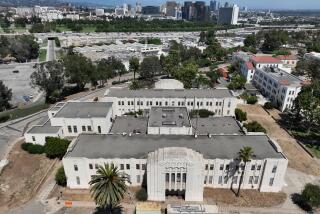How orphaned parrots help troubled veterans, and vice versa

The “Feathered Friends” therapy program at the VA Medical Center in West L.A. offers veterans a chance to work through their psychological issues by caring for orphaned exotic birds.
- Share via
Some troubled Los Angeles veterans are getting help through an unlikely source: orphaned parrots.
The West L.A. campus of the Department of Veterans Affairs has an exotic-bird rescue facility on its sprawling 387-acre campus. It houses 21 aviaries with nearly 40 parrots that are part of a unique animal-assisted therapy program for veterans coping with post-traumatic stress disorder, depression, alcoholism and other ailments.
The Feathered Friends program at the VA Medical Center gives veterans a chance to work through their issues by caring for orphaned exotic birds.
“Trauma has many tentacles,” said Navy veteran Matthew Simmons, director of operations at Serenity Park Parrot Sanctuary.
Simmons’ wife, psychologist Lorin Lindner, established Serenity Park. At the facility, veterans volunteer to feed and clean up after the orphaned birds, often nursing the animals back to health.
The program has had a “huge success rate” with the veterans “that no one gave a chance to succeed … me included,” said Simmons, who was a yeoman during Operation Desert Storm.
Another such success story is Lillyin Love, a Coast Guard helicopter search-and-rescue veteran who had PTSD.
“I don’t even know if I’d be here without this place,” said Love, who was diagnosed in 2001 and has cycled through the VA’s psychiatric ward many times.
The bird sanctuary “keeps me out of the hospital,” she said, adding, “It keeps me sane. It’s the best therapy for myself that I’ve found to live a more fulfilling, rewarding life.”
Love calls the sanctuary her “oasis of peace” and says the parrots are like her kids.
“This place gave me structure in my life … and the birds helped to get me out of myself,” she said. “They taught me a lot about patience, responsibility, particularly trust, learning to have a commitment [and] to stay in the moment, stay present.”
Others, such as Navy veteran James Minick, echoed Love’s sentiments about the therapy program.
“It’s a neat thing,” he said, “how people and animals that have had trauma and bad experiences can get together and basically help each other.”
The Sept. 11, 2001, attacks motivated the 42-year-old Ohio native to join the Navy, where he had a career in aviation for 10 years. Minick helps Simmons manage Serenity Park and says he has come a long way from a time following his service when he struggled with alcoholism and once attempted to commit suicide.
The softspoken Minick credits the bird sanctuary with his new outlook.
“When veterans come here,” he said, “I see their eyes when they see a parrot and there’s a connection. It’s like a smile from the inside, and it looks like some of these guys haven’t smiled in years.”
Simmons, who also runs another animal-assisted therapy program outside of the VA at the Lockwood Animal Rescue Center in the Los Padres National Forest (this time with wolves), compares the parrots to the veterans in the program. “They don’t know if they’re wild or domestic,” he said.
Simmons credits the program’s back-to-nature approach for its success with veterans coping with a slew of psychological issues.
“Anger and resentment are not going to solve this problem,” he said. “Clinical diagnosis will solve some. But what it is, is it’s an inside job, and we’ve got to give them the tools to heal internally … outside the brick and mortar.”
Twitter: @sarahHwaris
More to Read
Sign up for Essential California
The most important California stories and recommendations in your inbox every morning.
You may occasionally receive promotional content from the Los Angeles Times.











